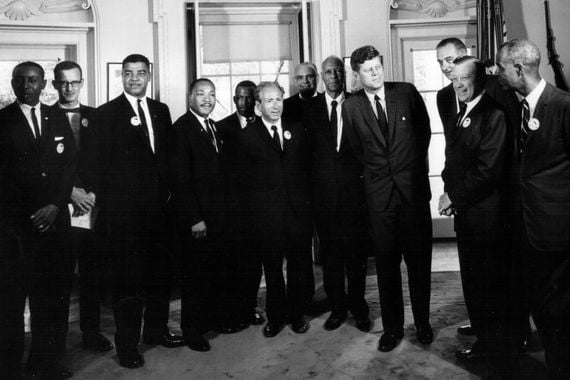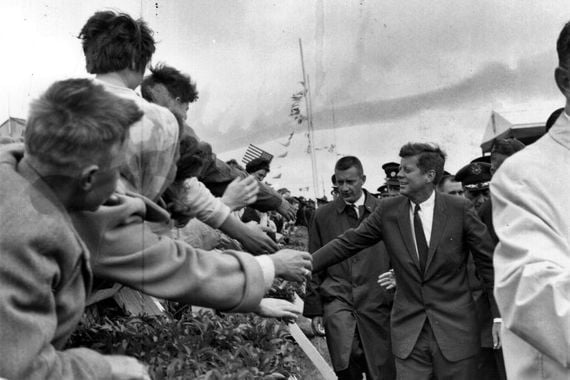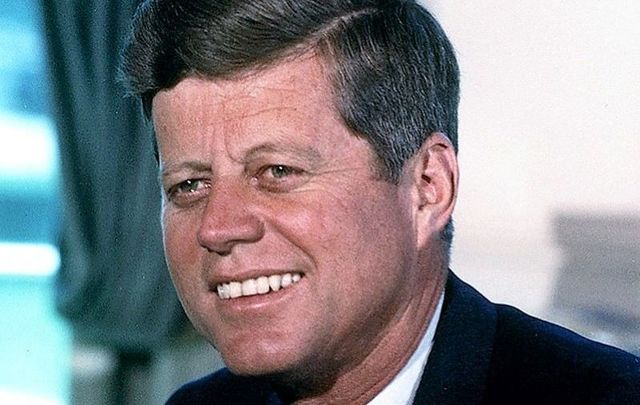John F. Kennedy challenged us to be our best selves. His message resonates even more today.
*Editor's Note: This article was submitted to IrishCentral by James Flannery, a professor at Emory University and a distinguished Yeatsian scholar who for many years hosted a series of Yeats Plays at the Abbey Theater in Dublin.
Unfortunately, too many people have forgotten what it was like to be alive at a time when JFK symbolized everything that is truly great about our country: an abiding quest for excellence and personal distinction along with a commitment to furthering the opportunities of all human beings to achieve the fullness of their potential.
For instance, how many of your readers are aware of the national television address delivered by President Kennedy on June 11, 1963, in which he described racial discrimination in our country as “a moral issue as old as the Scriptures and as clear as the American Constitution?”
He went on to announce that he was introducing to Congress a comprehensive Civil Rights Bill that would finally bring an end to segregation in public education while protecting the right to vote and equal opportunity in housing and employment on the grounds that “race has no place in American life or law.”
Professor Henry Louis Gates of Harvard has described watching Kennedy’s speech as a child with his parents in stunned silence. “John F. Kennedy had accomplished a feat that no other president, not even Abraham Lincoln, had achieved: committing the United States to guarantee full justice for African-Americans in the eyes of the law.”
Martin Luther King Jr. was especially gratified by the way in which Kennedy framed the fundamental issue as a moral one. He sent a telegram to the President in which he called the speech “one of the most eloquent, profound and unequivocal pleas for justice and the freedom for all men ever made by any president.”
Kennedy’s stirring commitment was made with the stark realization that a huge struggle was ahead to win the votes needed in Congress to pass the legislation he was proposing, particularly in the face of the fierce opposition of Southern segregationists as well as a significant number of undecided members who still had to be convinced.
He made these concerns clear in a meeting in the White House on June 22nd with civil rights leaders who were then laying plans for the historic March on Washington later that summer, among them the late Congressman John Lewis. Kennedy voiced his support for a peaceful demonstration, given the success of that movement thus far. But he pointed to the dangers that it might turn violent, as so often had occurred with the Southern protests.
He also sought to persuade the leaders to change the final location of the demonstration from the Capitol to the Lincoln Memorial, stating that, “Some of these people are looking for an excuse to be against us. I don’t want to give any of them a chance to say, ‘Yes, I’m for the bill, but I’m damned if I will vote for it at the point of a gun.’ ”

President John F. Kennedy meets with civil rights leaders at the White House August 28, 1963. (Getty Images)
Robert Kennedy, as the Attorney General, offered to put the services of the Justice Department behind the demonstration with the help of police protection, portable toilet facilities, food, and water. He and Vice President Lyndon Johnson also reinforced the formidable challenges of passing the Civil Rights Bill, pointing out that the approval of the administration had already dropped from 80 percent to 47 percent as a result of the President’s proposal.
John Lewis, then 23 years of age and a firebrand, was asked to tame down some of the remarks he was intending to make, which compared the civil rights movement to Sherman’s march through Georgia. The President, who was leaving the next day for a monumental trip to Europe seeking to gain support in his ongoing battle against the advance of communism in the newly independent nations of Africa and elsewhere in the world, emphasized that these efforts as well as the very survival of his administration were threatened by his commitment to the civil rights movement. “We’re in this up to the neck. The worst trouble of all would be to lose the fight in Congress. We’ll have enough trouble if we win… A good many programs may go down the drain… What is important is that we preserve confidence in the good faith of each other.”
And then, before he left the room, Kennedy addressed these final remarks, as ever thinking of the future effect of the actions they were taking: “What seems terribly important is to get and keep as many Negro children as possible in schools this fall. It is too late to get equality for their parents, but we can still get it for the children – if they go to school and take advantage of what educational opportunity is open to them.”
In the obituary notices occasioned by the recent death of John Lewis, it was implied that the Kennedy brothers were less than fully committed to the civil rights movement. Nothing could be further from the truth. The concern of President Kennedy and Robert Kennedy was actually that the potential violence of the March on Washington might undermine the very purposes for which it was intended. Acknowledging that possibility was both realistic and practical as well as courageous.
Lewis later described the remarkable television address of the President on civil rights as “a shot in the arm for the movement” because in framing civil rights as “a moral issue” he had reminded Americans of our fundamental values as a nation.
President Kennedy embodied the promise of America. He challenged us to be our best selves as a people and to fulfill the highest vision of democracy. And, as he confronted the stresses of the civil rights movement placed on him, he began to actualize his own ideals. He met the challenges of his time to see beyond politics and partisanship, and began to respond to a higher law, one that asserts the inalienable right to dignity and respect.
I personally experienced the power of Kennedy’s moral commitment, passion, and eloquence on a concert tour of Europe that same summer with the Yale Russian Chorus. In West Berlin, just a week after Kennedy’s inspired “Ich Bin Ein Berliner” address to a huge crowd, wherever I went I was welcomed as an American who shared with the people there a profound faith in the values and advantages of democracy.
“Ich Bin Ein Berliner” became a rallying cry for people everywhere in the world who were hungering for the same rights and opportunities, including the Soviet Union. In Moscow, before the walls of the Kremlin, after members of the Chorus had gathered a crowd with our impromptu rendition of Russian folk songs, a man took me aside to whisper that he didn’t believe in the propaganda of the Soviet system.
When I asked him why he made this statement, he responded, “Because when you hear one version of so-called truth over and over again, you know it isn’t true. Your system allows freedom of expression with many different views. That is a truth your President understands, and that is why he is a man we trust and admire.”
As our own country has grown more and more mendacious, materialistic and grotesquely solipsistic under a president who himself embodies these debilitating values, President Kennedy’s extraordinary commitment to the civilizing agency of the arts is increasingly recognized as one of his most important legacies.
No American president has ever spoken more persuasively and passionately of the transformative intellectual and spiritual radiance of the arts than did JFK in these words delivered just a few weeks before his death at the dedication of a library at Amherst College named for the poet Robert Frost:
“I see little of more importance to the future of our country and our civilization than full recognition of the place of the artist… I look forward to an America which will reward achievement in the arts as we reward achievement in business or statecraft. I look forward to an America which will steadily raise the standards of artistic accomplishment and which will steadily enlarge cultural opportunities for all our citizens. I look forward to an America which commands respect throughout the world not only for its strength but for its civilization as well. And I look forward to a world which will be safe not only for democracy and diversity but also for personal distinction.”
It is fascinating to note that President Kennedy’s extraordinary statement on the importance of the arts to our national purpose was, according to historian Arthur Schlesinger, intended as a direct challenge to premier Nikita Khrushchev’s crackdown on intellectual and artistic freedom in the Soviet Union. As Kennedy put it:
“The artist, however faithful to his personal vision of reality, becomes the last champion of the individual mind and sensibility against an intrusive society and an officious state… We must never forget that art is not a form of propaganda, it is a form of truth… And the nation which disdains the mission of art invites that fate of Robert Frost’s hired man, the fate of having ‘nothing to look backward to with pride, and nothing to look forward to with hope.'"
President Kennedy could not have been more Irish than in his espousal of the arts as a vital measure of a nation’s moral character and cultural distinction. That was what he proclaimed again and again in a two-day visit to Ireland during his summer of 1963 European tour – a visit he later described as the happiest time of his life. Again and again, he quoted passages from the work of Yeats, Joyce, and Shaw to show how much these writers meant to him.
When for the first time I visited Ireland a few weeks later, people everywhere told me of the incredible impression made by JFK. “He made us as proud to be Irish as if he were our own son,” said a relative with tears in his eyes. “And he knew and loved our culture even better than we did ourselves.”
“This is not the land of my birth,” Kennedy said on the morning of his departure from Ireland, “but it is the land for which I hold the greatest affection, and I certainly will come back in the springtime.”

President John F. Kennedy in Ireland. (Getty Images)
Alas, that promise was not to be fulfilled. Among the remarks the President intended to deliver in Dallas on that fateful day of November 22, 1963, were these: “A nation can be no stronger abroad than she is at home. Only an America which practices what it preaches about equal rights and social justice will be respected by those whose choice effects our future.”
No one was more responsive than Martin Luther King Jr. to the global reach of Kennedy’s appeal to the moral conscience of the world, or to the tragic loss inflicted on America at the hands of a white supremacist who had been radicalized by a festering hatred of Kennedy’s promotion of civil rights. King later spoke of the way Kennedy had fully embraced and expressed the ideals of a popular movement while remaining faithful to his own sense of truth: “He frankly acknowledged that he was responding to mass demands and did so because he thought it was right to do so. That is the secret of the deep affection he evoked. He was responsible, sensitive, humble before the people, and bold on their behalf.”
The death of President Kennedy followed in 1968 by the assassinations of Robert Kennedy and Martin Luther King Jr. were blows to the American psyche from which our nation has never recovered.
My reasons for bringing this tragic chapter in our history to the attention of your readers is to make them aware of all that seemed to have disappeared when these incredible leaders were suddenly taken from us.
What I also hope to make them aware of is that, some sixty years later, the example, ideals, and words of President Kennedy still speak to the values we aspire to attain as a nation.
*James Flannnery is Professor of Arts and Humanity Emeritus at Emory University in Atlanta, Georgia. He is a distinguished Yeatsian scholar and for many years hosted a series of Yeats Plays at the Abbey Theater in Dublin.




Comments